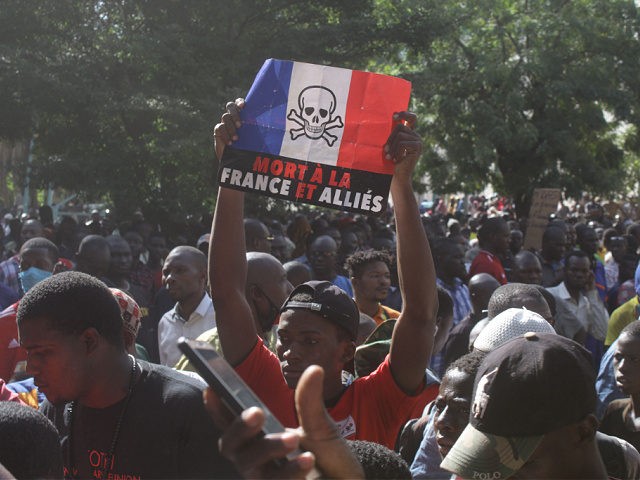French President Emmanuel Macron on Wednesday formally announced the “end of the Barkhane operation,” France’s decade-long mission against jihadis in the Sahel region of Africa.
Macron said a new strategy would be formulated with new partners as a “consequence of what we have experienced,” a tactful admission that France’s relationship with certain African powers has grown sour, especially strategically-vital Mali.
“Our military support for African countries will continue, but according to new principles that we have defined with them,” Macron said during a speech on military policy at the naval base in Toulon.
“Over the coming months we must determine how to profoundly change our methods and our commitments alongside our African partners,” he said, anticipating “lighter and more integrated deployment with them.”
Operation Barkhane began in 2013 as a French military intervention against al-Qaeda, which was backing a violent insurrection against the government of Mali by a nomadic people called the Tuareg.
The Tuareg were restless and unhappy with the modern Malian state ever since it gained independence from France in 1960 and had fought several unsuccessful rebellions in the past, but now they had support from al-Qaeda and a supply of fighters with combat experience returning from Libya after the fall of dictator Moammar Qaddafi.
The offensive the Tuareg launched in January 2012 was exceptionally brutal, displacing tens of thousands of Malians and drawing repeated condemnations from the French government for the summary execution of Malian soldiers and civilians. International human rights monitors criticized the Malian military for abuses as well.
France intervened at the request of the Malian government, which greeted French forces with a hero’s welcome. At its peak, Operation Barkhane included some 5,500 French troops, deployed to Niger, Chad, and Burkina Faso as well as Mali. France reported suffering 53 military casualties during the nine-year deployment.
About 3,000 French soldiers are still on the ground in the other countries, but they withdrew from Mali in August, in part because the government of President Ibrahim Boubacar Keita was overthrown by a military coup in August 2020, producing a “transitional government” that was overthrown by another coup in 2021.
Mali’s relations with France and the European Union deteriorated rapidly after the coups, especially once the junta began developing close ties with Russia and allegedly hiring mercenaries from Russia’s infamous Wagner Group.
The junta called on France to begin removing its troops “without delay” in February 2022, and in May it announced it was pulling out of its defense agreement with Paris, citing alleged “flagrant violations” of Malian sovereignty.
The French-led European Takuba task force that began operations in 2019 pulled out in July 2022, followed by France’s full complement of forces a month later. France offered to provide Malian troops with air support against the jihadis, but the offer was curtly refused.
In an August letter to the U.N. Security Council, the junta accused France of supporting the jihadis and committing “acts of aggression” against the Malian military regime, including alleged French violations of Malian airspace to “collect intelligence for the benefit of terrorist groups … and to drop arms and ammunition to them.”
France angrily rejected these accusations, insisting jihadi groups “remain its designated enemies across the planet.” French officials complained about a flood of “disinformation” in Mali that sought to turn the public against French forces while glorifying Russia.
Macron’s administration vowed to continue fighting terrorism in the Sahel region, but it was increasingly clear the reconfigured intervention would no longer be known as Operation Burkhane.
The Council on Foreign Relations (CFR) wrote a grim post-mortem on Operation Burkhane in July 2021, after Macron announced a partial drawdown of French forces:
The French strategy has been to hold off the jihadis to allow the states in the region to develop the capacity to see to their own defense. The longer they stayed, the French sought to “internationalize” their involvement, seeking the participation of other EU states—the motivation behind Takuba—to complement Barkhane and MINUSMA, the UN peacekeeping force in Mali, and emphasizing that the lead should be taken by the African governments under threat. Successive Washington administrations have supported the French approach and provided logistical assistance.
The strategy has not been successful, with jihadi groups seeming to go from strength to strength. In 2021, the jihadi threat is more extensive than in 2013, causing anxiety even in Ivory Coast and Senegal.
In hindsight, the French military presence has been too small in a vast region to be transformative. The governments which the French support are largely run by elites isolated from the populations they ostensibly govern, leading to coup attempts, including two successful attempts in Mali in the last year. Domestic security services are regularly accused of human rights abuses.
Macron’s office said on Wednesday the new Sahel strategy would “reduce the exposure and visibility of our military forces in Africa and to focus on cooperation and support; mainly in terms of equipment, training, intelligence and operational partnerships for countries that want it.”
“In the field of perceptions, Barkhane continues to occupy a very important presence on social networks. It is necessary to put a clear end to it in order to switch to another logic,” the statement from Macron’s office said.

COMMENTS
Please let us know if you're having issues with commenting.